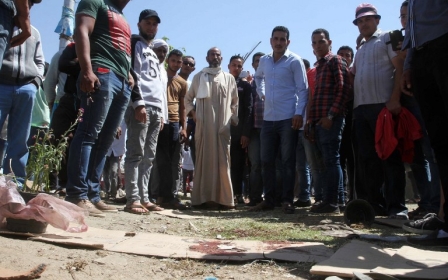Egyptians brace for more protests as government abuses mount

CAIRO - When an Egyptian police officer shot and killed a man selling tea on the outskirts of Cairo this week, onlookers tried to stop paramedics from taking away his body.
“People didn’t want the ambulance to go,” said Alaa Metwaly, a graduate student who arrived at the scene a half hour after the incident. “It was as if the body was the only evidence they had.”
Moustafa Mohamed Ahmed was selling tea in Rehab City, an eastern district of New Cairo city, on Tuesday when a fight broke out between him and low-ranking police officer Zeinhem Abdel Razzaq, the Interior Ministry said in a statement posted on Facebook.
Razzaq, who was on patrol, shot and killed Ahmed and wounded two nearby people who were selling flowers. Soon, a crowd gathered, chanting “Police are thugs”.
After the shooting, the ministry said warrants were issued for the arrest of Razzaq and two police officers who accompanied him.
But at the scene of the shooting, Metwaly said, where onlookers turned over Razzaq’s empty police car and chanted "police are thugs", there was a sense that, without Ahmed's body, justice would remain elusive.
“They kept saying that they knew no one would be held accountable,” she said.One bystander raised an empty bullet casing in the air as someone filmed: "This is the police," he said. "This is Sisi."
Ahmed's killing comes on the heels of the shooting death of a taxi driver by a police officer in a fare dispute, and in the midst of allegations of widespread torture and deaths in custody at the hands of Egyptian police.
It also follows a wave of recent protests across a wide segment of the Egyptian public, from lawyers and doctors to students and writers, all in violation of the country’s law banning demonstrations without a permit.
The most recent protest, held last Friday, saw thousands of people outside the Journalists’ Syndicate in downtown Cairo picketing the government’s decision to hand over two Red Sea islands to Saudi Arabia.
More than 100 protesters were arrested, security officials told local media. Most have been released, but 25 remain in custody.
But on Thursday night and Friday, ahead of a second protest against the islands scheduled for Monday, police reportedly arrested at least 40 people at downtown Cairo cafes and their homes. The arrests came a day after Shorouk News reported that President Abdul Fattah al-Sisi ordered police to keep protests from happening, an order that Sisi later denied giving.
As events such as these mount, some Egyptians say the country may be on the verge of another mass uprising like that of 2011.
Tarek Hussein - an activist whose brother Mahmoud was arrested in 2014 walking home from a protest in a T-shirt saying ‘Nation Without Torture’ and who was held in pre-trial detention for more than 600 days - said rights abuses under former President Hosni Mubarak are “incomparable to what we see now”.
“One learns,” he said, “that all these things next to each other breed anger, and this anger can lead to a sort of revolt against the Interior Ministry and, maybe later, this will build to revolt against the entire regime.”
Khaled Ali, a former presidential candidate and public figure popular among leftist activists, wrote on his Facebook page that the “repressive, frenzied campaign to arrest young people from the streets, cafés, and their homes, does not express the strength of the system as much as it expresses how nerve-wracked it is. It's lost its balance and is terrified of the popular movement against the sale of the islands.”
The now exiled Ayman Nour, another former presidential figure who stood against Mubarak, wrote on his Twitter page that “Sisi is creating a climate similar to January 2011.”
The Muslim Brotherhood, the 6 April movement, and the Revolutionary Socialists all called for people to take to the streets last Friday in mass protests they coined “the Friday of the Land”.
The MB released a statement on its website saying Sisi was “selling Egypt” and that it was an “organized crime” intended to “serve the Zionist entity.”
Meanwhile, 6 April released a statement on its Facebook page Friday saying: “The regime has gone crazy… we’d like to tell you that now we are mobilizing people for [April] 25th."
“The only difference is that they are also the ruling group,” Soueif said.
Of the shooting of the tea vendor, she said: “It will happen again. We have already seen how it is worse every time. It will continue and it will only get worse because there is no legal accountability."
Any incident these days, she said, could be the final straw before a major uprising. “But which incident and when, we can’t know for sure,” she said.
Stay informed with MEE's newsletters
Sign up to get the latest alerts, insights and analysis, starting with Turkey Unpacked
Middle East Eye delivers independent and unrivalled coverage and analysis of the Middle East, North Africa and beyond. To learn more about republishing this content and the associated fees, please fill out this form. More about MEE can be found here.




